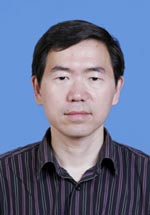 |
| 張明權(quán) |
遲到是人們的通病,堵車、回去取東西、記錯約會時間、突然發(fā)生意想不到的事件等等,通常都會是遲到最好的理由。但是,守時的人總是守時,他們似乎永遠時間充沛,而遲到的人總是遲到,他們幾乎總是時光苦短。
對遲到者而言,無論他們怎樣安排好充裕的時間,好讓赴約變得從容,但他們依舊會是約會上最后的出現(xiàn)者。遲到者以遲到來自視高于別人,因為毋庸置疑,別人在等待中會不斷地想到自己。
參考譯文:
Do you have the “psychology of lateness”?
To procrastinate is human. Generally, traffic, something to fetch, a mistaken appointment, or a sudden incident tops the list of excuses for being late. Ironically, punctual people always keep time, who never seem to be lacking in it while unpunctual people do almost exactly the opposite. No matter how hard they have tried to allow sufficient time for an appointment, latecomers somehow “manage” to be the last arrivals for the meet-up. Simply because they have in mind that they are undoubtedly above others who have been kept waiting for and thinking of them every now an then.
這是一份遲到的點評,但要申明的是,我并沒有“遲到心理”,因為參與本欄目翻譯的網(wǎng)友的水平越來越高,在上述參考譯文中,我借用了Sunnie Tian譯文中的幾個表達方式,包括ironically, the last arrivals for the meet-up, simply because等,該網(wǎng)友的譯文在論壇中也得到了其他網(wǎng)友的肯定。
剛剛提到的“遲到心理”的翻譯涉及到術(shù)語翻譯問題。這個術(shù)語是心理學(xué)家讓-皮埃爾?溫特提出來的,但由于網(wǎng)路上只能找到介紹該心理學(xué)家的法語網(wǎng)頁,所以暫時沒有查到該詞的固定英語譯名,權(quán)且翻譯成the psychology of lateness,等于lateness psychology。
在網(wǎng)友的翻譯中,優(yōu)秀的譯文不少,但也有不少是初學(xué)者,翻譯出來的東西錯誤太多,可能還沒有掌握最基本的翻譯要領(lǐng)和翻譯技巧。這里我揀選一些翻譯錯了的地方進行點評,以幫助初學(xué)翻譯者掌握必要的翻譯知識。
1) 遲到是人們的通病
網(wǎng)友譯文:Being late is the common failing for most of people.
英譯漢時,注意英語表達的準確性要高于漢語,所以這句話最好翻譯成:Being late is one of the common failings for most people. 還有就是most of people是錯誤的表達。
2)堵車、回去取東西、記錯約會時間、突然發(fā)生意想不到的事件等等
網(wǎng)友譯文:such as, traffic jam, go back and take something leave behind, mistake appointment time and something unexpected happen
在漢譯英列舉事物時,要注意所列舉的事物是否能作相同的句子成分,漢語是沒有語法形式變化的,這一點是初學(xué)翻譯的同學(xué)必須注意的要點之一。
3)遲到的人總是遲到,他們幾乎總是時光苦短。
網(wǎng)友譯文:the late person is late all the time as if they always lacked of time.
“遲到的人”不能直接翻譯成the late person,這里涉及英語造詞的問題,我們不能把漢語的造詞規(guī)則任意推廣到英語中,英語late做定語往往表示“晚期的、已故的”等含義。再者,lacked of作謂語也錯了。另外,這一部分中文與前面的相關(guān)部分存在重復(fù),因此翻譯的時侯可以考慮省略譯法,具體見參考譯文。
4)遲到者以遲到來自視高于別人
網(wǎng)友譯文:The late comers think themselves above the others by being late.
Think應(yīng)改為think of或consider。感謝Sunnie Tian提供了很好的譯文:Simply because they are inclined to jump on their high horses.
參考譯文:
“3S ladies” in Shanghai embraces the highest index of loneliness in China, a report says
According to a recent survey carried out by an unnamed match-making website, “3S ladies” in Shanghai are ranked as the loneliest women in China, followed by the so-called “l(fā)eftover ladies” in Sichuan and Beijing. The report says that women born between 1973 and 1986 have the strongest sense of “being a 3S lady”, and those “3S ladies” born in 1983, a percentage of 57.9 in all, embrace the strongest sense of “being left over” among all age groups. 60% of the “3S ladies” polled in Beijing are “otaku girls”, the so-called “indoors women”, who have an ever stronger sense of “being a 3S lady” since they were 26 years old. Half of these women identify themselves with “3S ladies” when they come close to 30 years of age. However, their sense of “being left over” may dwindle when they grow older for the reason that they perhaps have been accustomed to this kind of status.
這段文字的翻譯首先要搞清楚兩個流行概念的翻譯,也就是“剩女”和“宅女”。實際上,關(guān)于“剩女”翻譯的文字在網(wǎng)上都可以查得到,前面的點評欄目也涉及到該詞的翻譯,這里要強調(diào)的是,如果我們選擇了其中一個詞,但又擔(dān)心讀者誤解的話,可以列出另一種說法,尤其是根據(jù)漢語直譯的說法。例如,在參考譯文中所見到的,“otaku girls”, the so-called “indoors women”。
相對上面一個譯題,這段文字不算太難。其中的難點,比如“寂寞指數(shù)”、“剩感”等,基本上可以直譯解決。我們繼續(xù)挑出一些翻譯基本技巧上的問題進行分析:
1) 近日,某婚戀網(wǎng)站在全國范圍進行“剩女”相關(guān)調(diào)查,調(diào)查顯示上海“剩女”寂寞指數(shù)最高,四川北京“剩女”的寂寞指數(shù)緊隨其后。
網(wǎng)友譯文:In recent days, some online personals sites doing a survey relevant to the nation wide “l(fā)eftover ladies”, studying shows that the rate of shanghai leftover ladies are the highest, followed by Sichuan and Beijing.
從這里的翻譯可以看出,該網(wǎng)友意圖使用一個獨立主格結(jié)構(gòu)來翻譯‘某婚戀網(wǎng)站在全國范圍進行“剩女”相關(guān)調(diào)查’,但忽略了漢語中所重復(fù)的“調(diào)查”一詞不需要兩次出現(xiàn)在譯文中。 2) 根據(jù)調(diào)查以1973年到1986年出生的女性“剩”感最強烈。其中,1983年出生的“剩女”占57.9%,成為各年齡段中“剩”感最強者。
網(wǎng)友譯文:According to the poll, females feel most strongly loneliness was born in between 1973 and 1986. In which 57.9 percent of 3S ladies who were born in 1983, felt most strongly loneliness. 該網(wǎng)友的翻譯明顯沒有搞清楚英語的句子結(jié)構(gòu),females feel most strongly loneliness was born…這里有兩個謂語,而且strongly是副詞,修飾名詞的應(yīng)該是形容詞。In which部分不應(yīng)該單獨成句。
3)但是隨著年紀的增長,或許是這種狀態(tài)已經(jīng)成為習(xí)慣,反而不介意自己“剩或不剩”了。 As this feeling of being lonely 3s-ladies grows to be a habit, they have never minded being called 3s-ladies or not any more.
這句翻譯本來挺好的,但句子中的時態(tài)使用明顯是把兩個時間關(guān)系搞混了,“成為習(xí)慣”是已經(jīng)發(fā)生的事情,應(yīng)該用完成時,而“反而不介意了”,是現(xiàn)在的結(jié)果,應(yīng)該用一般現(xiàn)在時或?qū)頃r。
參考譯文:
For the sons of the son of an empty nester
11 of 100 households polled in Liaoning province, China turn out to be families termed “empty nests” of old couples living on their own. With a car and an apartment house bought for them by their parents, children of the “empty nesters” have “flown” away like “newly-fledged birds”, but they continue to get an allowance for their daily life from their parents. According to a recent sampling survey promulgated by Liaoning Survey Organization affiliated to the National Bureau of Statistics of China, for at least an average of 10 days in a month the children return to their parents’ home for a meal. Moreover, the adult children get an allowance from their parents averaged at more than RMB 200 each month. However, this does not imply that their parents are well-off people. On the contrary, these elders live a frugal life and look forward to accumulating more “money for crossing the river”, money for a rainy day, money to cover their medical expenses in the future.
這段文字中的比喻比較多,這是翻譯時必須注意的地方。這里的比喻帶有系統(tǒng)性,家被比喻成了鳥巢,于是有了“空巢老人(empty nesters)”、“飛(fly)”、“小鳥(fledgling)等,另外“過河錢(money for a rainy day)”也是一個比喻。這一段文字我想分析一個網(wǎng)友的整段譯文,先抄錄如下:
Out of 100 households in Liaoning Province, 11 are empty nests where old couples are living by themselves. Even they have bought apartments and cars for the "little birds" that have "flown off". It’s not enough--they continue to pay for their children's livings. As a recent sample survey by a Liaoning team from the country's National Bureau of Statistics (NBS) shows, these adult children pay at least 10 visits a month to their parents’ home for free meals. Moreover, parents have to support their children with over 200 yuan a month. It doesn't mean they are rich. On the contrary, they're thrifty in their lives in the hope of saving more for their rainy day funds to cover their own medical treatment expenses in the future.(我訂正了部分拼寫及格式錯誤)
本譯文整體較好,除了我訂正的部分拼寫及格式錯誤外,總體上屬于一篇合格的譯文,然而在隱喻處理上,仍然存在部分問題。在第一句中,out of 100 households…, 11 are empty nests,在銜接上比較突兀,前面說調(diào)查了100個家庭,后面說11個是空巢。接下來第二句中,直接說給“l(fā)ittle birds”that have “flown off”仍然存在這個問題,沒有交代清楚,誰是那些飛走的小鳥呢?英語是在形式上邏輯性比較強的語言,即便是用比喻,也要交代清楚一些才好。下文中the country’s要交代清楚是China。Parents have to support their children with over 200 yuan a month. 這句翻譯明顯是不對的,回譯成中文就是“父母以每月200元供養(yǎng)他們的孩子”。實際上,200元是一種貼補,不是全部的生活費用。另外,原文中有關(guān)“平均”的字眼都沒有翻譯出來。最后一句中for their rainy day funds用來對譯“過河錢”是可以的,但在一些細節(jié)的處理上還需要潤色一下。當(dāng)然,上述分析絲毫不包含否定這位網(wǎng)友譯文的意思。
最后真誠地說一句抱歉,前段時間工作實在太忙,加上去年以來參加了詞典的編寫工作,實在騰不出很多時間寫翻譯點評,今后爭取合理安排時間,繼續(xù)把我們的欄目辦下去,歡迎各位網(wǎng)友繼續(xù)參與答題。
本文僅代表作者本人觀點,與本網(wǎng)立場無關(guān)。歡迎大家討論學(xué)術(shù)問題,尊重他人,禁止人身攻擊和發(fā)布一切違反國家現(xiàn)行法律法規(guī)的內(nèi)容。
更多文章
“作者說話”還是“譯者說話”? --談一談譯者的角色身份認同
專家簡介:
張明權(quán),安徽省固鎮(zhèn)縣人,江蘇大學(xué)外國語學(xué)院副教授,英語語言文學(xué)碩士,上外博士課程班進修。主要從事英語語言學(xué)和翻譯學(xué)研究,在國內(nèi)外學(xué)術(shù)期刊發(fā)表論文10余篇,出版譯著兩部,發(fā)表其他文章20余篇,有大量翻譯實踐經(jīng)驗,翻譯總字數(shù)接近200萬。Email: mqzhang@ujs.edu.cn。
(作者:張明權(quán) 中國日報網(wǎng)英語點津 編輯:Julie)
